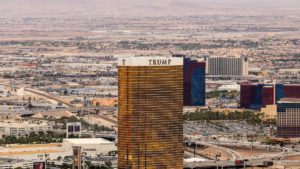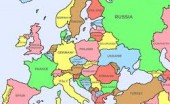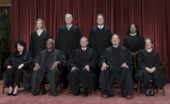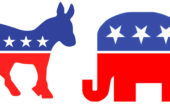Re Ian Bremmer 'Could third-party candidates upend the 2024 US election?' 3 April The current political movement in the USA…
U.S. Foreign Relations post Trump election
Written by Diana Thebaud Nicholson // December 2, 2016 // U.S. // Comments Off on U.S. Foreign Relations post Trump election
U.S. Foreign Relations in 2015-16
So, Why Can’t You Call Taiwan?
President-elect Donald Trump has committed a sharp breach of protocol—one that underscores just how weird some important protocols are.
(The Atlantic) There are various reasons Trump might be intentionally poking China. Trump spoke harshly about China throughout his presidential campaign, accusing Beijing of currency manipulation, land-grabbing, and taking advantage of the United States. He also showed a willingness, if not an eagerness, to slaughter nearly every sacred cow of American foreign policy.
Some Trump confidants have suggested existing policy on Taiwan should become one of them. John Bolton, who served as Bush’s ambassador to the UN, has been advising Trump, and Bolton has been a very public advocate of the U.S. cozying up to Taiwan in order to show strength against China.
Some observers suggested that the call fits with the pattern of Trump intertwining his business and political interests, pointing out that he’s currently seeking to open luxury hotels in Taiwan.
(PBS NewsHour) Trump’s call with Taiwan’s president could threaten China relations
1 December
‘Terrific guy, fantastic country’: Trump heaps praise on Pakistan’s leader
Pakistan’s government has released details of an extraordinary telephone call between the US president-elect and Pakistan’s prime minister Nawaz Sharif
(The Guardian) Donald Trump has heaped praise on Pakistan, traditionally a troublesome US ally, saying it is a “fantastic country, fantastic place of fantastic people” according to an official statement released by Islamabad.
The US president-elect made his effusive comments in a phone conversation on Wednesday with Nawaz Sharif, prime minister of the nuclear-armed state, whom Trump hailed as a “terrific guy”.
The statement by the government’s Press Information Department quoted Trump saying: “As I am talking to you prime minister, I feel I am talking to a person I have known for long. Your country is amazing with tremendous opportunities. Pakistanis are one of the most intelligent people.”
26 November
What now for US-Cuba relations? Aleem Maqbool, BBC News, Washington
In a sense though, Castro’s death gives Mr Trump room for manoeuvre in his tough stance towards the Cuban regime to make more progress, particularly in the economic relationship between the two countries.
The same Cuban-Americans praising him now will be watching closely to see if he keeps to his promise of demanding real reform in Cuba before adhering to the commitments made by his predecessor.
The NYT piece by six writers and Barrie McKenna’s article in the Globe & Mail point to the entanglements of foreign relations and the Trump brand, but so far no-one seems to have suggested that these buildings might become prime targets for dissidents in their respective countries. There is no doubt that aside from the frequently appalling taste exhibited, they are offensive symbols of economic inequality.
Potential Conflicts Around the Globe for Trump, the Businessman President
 (NYT) In Brazil, for example, the beachfront Trump Hotel Rio de Janeiro — one of Mr. Trump’s many branding deals, in which he does not have an equity stake — is part of a broad investigation by a federal prosecutor who is examining whether illicit commissions and bribes resulted in apparent favoritism by two pension funds that invested in the project.
(NYT) In Brazil, for example, the beachfront Trump Hotel Rio de Janeiro — one of Mr. Trump’s many branding deals, in which he does not have an equity stake — is part of a broad investigation by a federal prosecutor who is examining whether illicit commissions and bribes resulted in apparent favoritism by two pension funds that invested in the project.
Several of Mr. Trump’s real estate ventures in India — where he has more projects underway than in any location outside North America — are being built through companies with family ties to India’s most important political party. This makes it more likely that Indian government officials will do special favors benefiting Mr. Trump’s projects, including pressuring state-owned banks to extend favorable loans.
In Ireland and Scotland, executives from Mr. Trump’s golf courses have been waging two separate battles with local officials. The most recent centers on the Trump Organization’s plans to build a flood-prevention sea wall at the course on the Irish coast. Some environmentalists say the wall could destroy an endangered snail’s habitat — a dispute that will soon involve the president of the United States.
And in Turkey, officials including President Recep Tayyip Erdogan, a religiously conservative Muslim, demanded that Mr. Trump’s name be removed from Trump Towers in Istanbul after he called for a ban on Muslims entering the United States. More recently, after Mr. Trump came to the defense of Mr. Erdogan — suggesting that he had the right to crack down harshly on dissidents after a failed coup — the calls for action against Trump Towers have stopped, fueling worries that Mr. Trump’s policies toward Turkey might be shaped by his commercial interests.
Branding the presidency
With his trademark swagger, the president-elect is venturing into a minefield of conflicts where no U.S. president has dared go before
(Globe & Mail) Trump-owned condos, resorts and golf courses have become convenient backdrops for the cameras as he forges the team and policies of his new administration. And behind closed doors it’s business as usual. His daughter Ivanka, an executive in his organization, sits in on meetings and phone calls with foreign leaders, while his son-in-law Jared Kushner, a real estate developer, advises him on policy. And the president-elect met with British politician Nigel Farage in recent days, urging him to oppose a windmill farm that would mar the view from two Trump golf courses in Scotland.
The world has taken note: Philippine President Rodrigo Duterte has just appointed a real-estate developer who pays millions of dollars to put the Trump name on a tower in Manila as his special envoy in Washington.
Meanwhile, foreign diplomats say they are booking rooms at one of Mr. Trump’s newest ventures – a hotel located five blocks from the White House on land leased from the U.S. government – to ingratiate themselves with the incoming administration.
Trump, Putin and Kim make Abe miserable
(Japan Times) What a bad week for Prime Minister Shinzo Abe. His foreign policy initiatives lay in tatters with U.S. President-elect Donald Trump’s plans to dump the Trans-Pacific Partnership (TPP) and Russian President Vladimir Putin pouring cold water on Abe’s hopes of regaining some of the Northern Territories.
Abe also has his work cut out for him in trying to cope with developments on the Korean Peninsula, where Pyongyang’s nuclear weapons program is making progress while Seoul is paralyzed by a leadership crisis — complicated by an untested and erratic Trump. When it comes to the art of diplomacy and how to deal with security issues, Trump is in way over his head, especially in regard to Asia’s most urgent security threat: North Korea.
Trump’s temper and unilateralism are generating global uncertainties about U.S. reliability. For example, he has promised to rip up the nuclear deal with Iran, which aims to prevent proliferation. Ending the deal is supported by Congressman Mike Pompeo, Trump’s nominee for CIA director, even though the action has implications for engaging Kim Jong Un.
Trump may be right that the Iran agreement is flawed, but he doesn’t appear to have thought through the implications of walking away from it. Instead, he has suggested having hamburgers with Kim, naively overlooking how this might play with U.S. allies South Korea and Japan while blithely rewarding Pyongyang’s bad behavior evident in the recent missile tests.
Problematically, there are few signs that Trump intends to nurture a cooperative relationship with China. This means that enlisting Beijing’s help with North Korea is unlikely, so the door to engagement and negotiations looks closed. How will Trump deal with this grave situation?
Abe’s ‘made-in-Japan’ gift for Trump produced by China-owned firm
Prime Minister Shinzo Abe proudly gave a “made-in-Japan” gift to the maverick businessman — a luxury, gold-colored golf driver manufactured by Tokyo-based Honma Golf Co., which touts its top artisans’ skills at a factory in Yamagata Prefecture.
25 November
(Quartz) Hungary’s president hailed Donald Trump. After a phone call with the president-elect, Viktor Orban said on Friday that Trump will be good for Hungary. Orban has been vocally anti-Clinton, who nagged Hungary for its lack of democratic freedom, and has praised Trump for not being “ideologically limited.” Bilateral trade between the US and Hungary is small.
22 November
U.K. Rejects Donald Trump’s Call for Nigel Farage to Be Made Ambassador
Once again, President-elect Donald J. Trump seems to have gone out of his way to embarrass the British government.
(NYT) In a Monday night Twitter post, just as the British government was reaching out to Mr. Trump to reaffirm the “special relationship” with the United States that Britons prize, he suggested the appointment of Nigel Farage, the interim leader of Britain’s populist, anti-immigrant U.K. Independence Party, as ambassador to the United States.
The prime minister’s office quickly dismissed the recommendation, telling reporters: “There is no vacancy. We have an excellent ambassador to the U.S.” in Kim Darroch, a former national security adviser.
21 November
David Jones: Trump Faces Foreign Policy Challenge in East Asia
vs.
David Kilgour: The Upcoming Trump Administration and East Asia
18 November
Japan’s Shinzo Abe Discusses Security Alliance at Meeting With Donald Trump
Visit marks President-elect’s first face-to-face with a foreign leader since last week’s election
Ivanka Trump at Japanese Prime Minister Meeting Was ‘Out of a Tin Pot Oligarchy’
(Fortune) According to photographs taken at Trump Tower in New York City and published this week, the session was attended by Ivanka Trump, who has no government security clearance and is an executive at the Trump Organization.
16 November
Confusion over Trump’s first talks with foreign leader
(Reuters) One day before U.S. President-elect Donald Trump’s first meeting with a foreign leader, Japanese Prime Minister Shinzo Abe, Japanese officials said they had not finalized when or where in New York it would take place, who would be invited, or in some cases whom to call for answers. Uncertainty over the talks shows the difficulties in turning Trump from a freewheeling businessman into a sitting president with a watertight schedule and a fully functioning administration by his inauguration on Jan. 20.
14 November
Rudy Giuliani Says Defeating ISIS to Be Early Focus of Donald Trump’s Foreign Policy
At WSJ CEO Council, former New York City mayor suggests several times that he would be interested in secretary of state post
(WSJ) Former New York City Mayor Rudy Giuliani said Monday that President-elect Donald Trump would likely focus much of his initial foreign-policy strategy on destroying Islamic State, setting aside more vexing problems in the Middle East and elsewhere. (easy to say, a bit less easy to disentangle- did anyone ask him about the Kurds?)
The comments came shortly after The Wall Street Journal reported that Mr. Giuliani is one of the leading candidates to become Mr. Trump’s first secretary of state.
Putin, Trump agree to work to improve ties in phone conversation
Russian President Vladimir Putin and President-elect Donald Trump spoke over the phone Monday to discuss future efforts to improve the U.S.-Russian ties, the Kremlin and Trump’s office said.
“President-elect Trump noted to President Putin that he is very much looking forward to having a strong and enduring relationship with Russia and the people of Russia,” Trump’s office said in a statement.



